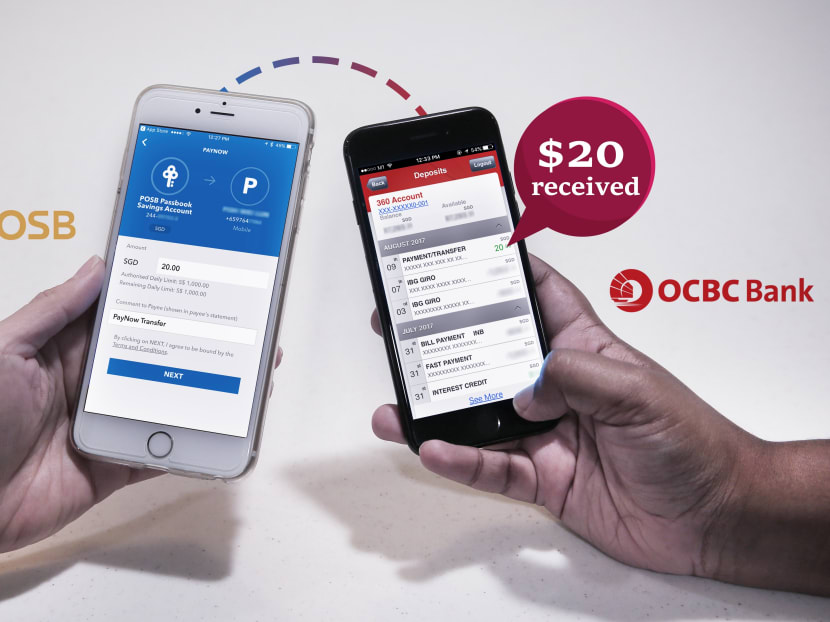Businesses can use PayNow from mid-2018
SINGAPORE — PayNow, a service which allows inter-bank transfers using just mobile numbers or personal identity numbers, will be extended to businesses around the middle of next year.

There are currently more than 600,000 Singaporeans registered on PayNow, less than five months after the service was launched. Photo: Prime Minister's Office
SINGAPORE — PayNow, a service which allows inter-bank transfers using just mobile numbers or personal identity numbers, will be extended to businesses around the middle of next year.
This means that businesses will be able pay each other, or receive payments from customers using the service.
Announcing this on Monday (Nov 13) at the Singapore FinTech Festival welcome dinner, Education Minister (Higher Education and Skills) Ong Ye Kung said there are currently more than 600,000 Singaporeans registered on PayNow, less than five months after the service was launched.
Consumers are using PayNow for everyday transactions such as splitting lunch bills and sharing the cost of joint purchases, noted Mr Ong, who sits on the Monetary Authority of Singapore (MAS) board. But businesses stand to gain the most from e-payment services in terms of greater efficiency and lower costs, he added. With the extension of PayNow to businesses, companies will be able to link their registration numbers, or Unique Entity Numbers (UENs), to their bank accounts.
PayNow is built on FAST, which is Singapore’s 24/7 real-time inter-bank retail payment system. It currently links bank accounts to mobile phone numbers or NRIC/FIN numbers, and enables people to make inter-bank transfers.
FAST and PayNow are “important conduits” of interoperability by plugging all banks, businesses and consumers onto a single platform, he noted.
Nevertheless, he pointed out that many other e-payment solutions have emerged, using different tokens and apps for different member groups. This can be confusing for the man in the street, he added. To this end, Singapore is working with the industry to make e-payments adoption more pervasive and convenient, he said.
Among other things, Singapore will be setting nation-wide common QR (quick response) specifications for e-payments, called the SGQR, through the Payments Council. Mr Ong said that major banks, e-wallet providers, and payment schemes are all on board the initiative, which will be progressively rolled out across the island from next year.
“So in the very near future, when you walk into a shop that accepts QR code payments, you should only see SGQR with all the acceptance marks underneath it,” said Mr Ong. “If your payment method is accepted by the merchant, you just need to use your smart phone to scan and pay to a single SGQR.”
Externally, Singapore is also striving for e-payments interconnectivity with its neighbours and other regional countries, said Mr Ong.
Nets, the Republic’s leading payment solutions provider, will establish a framework to enable crossborder payment linkages with the National Payment Corporation of India (NPCI). From the middle of next year, anyone who holds a NETS card in Singapore can make online purchases on any NPCI e-commerce merchant website in India.
Major Singapore banks UOB and DBS have also made inter-connection arrangements with UnionPay, which is the dominant payment card platform in China.
SANDBOX UPDATES
Mr Ong also gave updates on the MAS’ fintech regulatory sandbox, which was launched last year to allow firms to experiment in innovative solutions.
The MAS has since received more than 30 applications. However, it turned out that half of these applications did not require the sandbox, Mr Ong said.
“Many did not need any regulatory exemption and MAS told them to go ahead and launch their solutions,” he added.
So far, one applicant has graduated from the sandbox. Called PolicyPal, the licensed insurance broker was founded by entrepreneur Val Yap, who has been named one of Forbes Asia’s “30 under 30” in the finance and venture capital industry.
To use the service, a customer uses his phone to snap photographs of his insurance policies and uploads them onto PolicyPal’s mobile app. The app uses Optical Character Recognition (OCR) technology to digitise and analyse the documents, and give the customer an assessment of where he has duplicate or insufficient insurance coverage. Using the app, the customer can buy new insurance plans and store them in the same app.
Mr Ong said that as a startup, PolicyPal was unable to meet the MAS’ criteria for licensing, including track record and financial requirements. The OCR and applied analytics technologies were also untested.
Mr Ong said the MAS will expedite the sandbox application assessment so that firms can test and launch their innovative solutions faster.
The central bank will also further loosen the regulatory boundaries for cases where the risks do not outweigh the potential benefits of the solution to consumers, he added.






